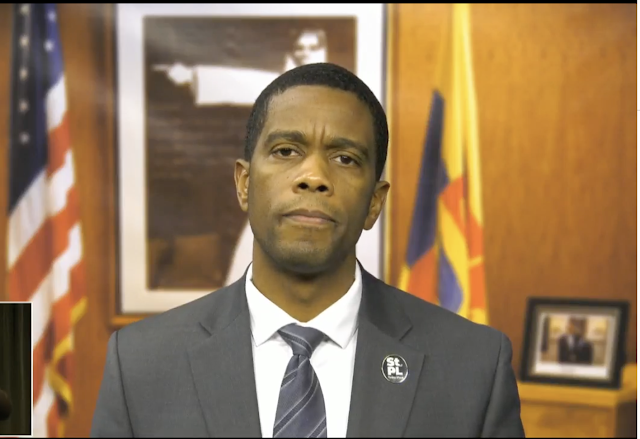 |
| [Mayor Melvin Carter III at the 2022 State of the City Address.] |
I have the honor of being on Mayor Carter's 41-member "stakeholder group" on Rent Stabilization, and am happy to report it's a diverse group of thoughtful people. We held the first of many two-hour meetings yesterday, and Mayor Carter gave a brief statement to inaugurate our proceedings.
As a part of my participation in the Task Force, I asked the Mayor's Office to focus on the parts of the rent stabilization policy debate that are not about a new construction exception. I believe that issue is largely separate from other key tradeoffs that come with rent control in US cities, things like disinvestment, discrimination, access, and regulatory expense.
It seems that Mayor Carter agrees. Here's the part of his opening remarks that covered his thoughts on exemptions for new construction in a city rent control policy. He was describing what he called the three parallel tracks happening right now around the city's rent control policy: implementation, short-term political changes, and a longer-term policy discussion.
This is a rough transcript some of his remarks to the stakeholder group:
Mayor Carter: We did have an ordinance passed by voters, and anticipated a May 1st implementation. We have a group of staff leaders moving forward to implementation, to be able to accept petitions from both renters and landlords, to have a process to process hearings, to help put that administrative process in place. That’s a piece [of the puzzle] at the staff level.
Also we are working through, at a political level with the City Council, a process to ask our City Council to establish and ordinance that would clarify exemption for new housing construction. It's important to me on a number of levels owe. We have thousands of units [of potential new housing] right now that are on pause, as we sort this through. I’m confident that everyone on this call, most of everyone in this entire conversation, actively desires to have a community where people can live with dignity in our city. As someone who navigates the challenges of a shortage of affordable housing every day, it's impossible for us to meet those goals in a city that cannot move forward with new housing construction.
Even more so, authentic engagement [like this task force] means me not wasting your time. I've developed a practice that, if I’ve already come to a conclusion on something, I’m not going to ask you to spend three weeks or a month to come up with recommendations about something where I’m already made up my mind to move forward. We’ve may agree or disagree on a policy, but I’m going to be respectful of your time.
Then there are … deliberations. I think there were a significant number people who read everything they could about rent stabilization and voted because the believed in the policy, but there were also a significant number who wanted to move forward this conversation [more generally]. From my perspective, those [issues] are questions that none of us should see as challenging or threatening to us. One of the habits we have in our office and administration is that we critically question everything we see. That critical questioning is something that helps us to hone our ideas and sharpen our concepts. Placing the outcomes we desire over the sides we get ourselves stuck in allows for engagement in a spirit of dialogue.
The Mayor continued, describing the scope and vision for our group, before we dove into introductions and our upcoming schedule.
It was good timing because yesterday Mayor Carter proposed language for a new construction exemption after his State of the City speech. (I'm attaching it below.)
Facing a severe housing shortage at all income levels, I believe this exemption is important for St. Paul. We need to grow the housing supply in order to prevent more rapid escalation of housing prices, especially the owner-occupied homes that are, by far, the primary way that most Americans get access to wealth. We also need to keep housing prices in check in order to prevent some of the downsides that come with rent control in cities with severe housing shortages, ones that lead directly to a decrease in the stock of affordable housing. I also believe that it's critical to build new housing in the city to address both St. Paul's insufficient tax base, and to meet the urgent need for climate action.
1 comment:
Here are my thoughts for the 41 member group. Free of charge, really:)
I hope the committee has access to very specific information about rent in St. Paul. Everyone coming from an organization in the group should bring their hard data. Get data from other sources for everyone to look at and agree on. No decisions should be made based on generalizations or simple anecdotes. Challenge perceptions.
Define the scope of the problem for St. Paul. One problem seems to be new owners jacking up rents on current residents. How often does it happen? What are the other problems? How big are they? Seek to understand the renter income side of the equation. Why can't people afford rent? How many people at a 3% cap are still going to get priced out? I know that's a lot to ask. My point is that the better defined the problem, the easier it is to find a targeted solution and to know what can and can't be solved with an ordinance and rules.
I tweet (OK rant) a lot about the 3% exception regulatory process. Please press Carter and the city on getting information out sooner. What is the stakeholder group's role in this exception process? I've read enough on other city's processes that I really think the exception process is not going to work well when it's released. I hope I'm wrong. I'm not cheering for failure or lawsuits.
Thanks for all the work you're doing.
Post a Comment